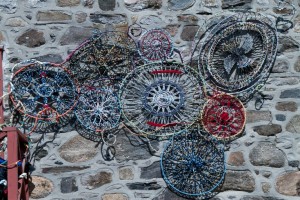
Sortie de placard | 2013
Vêtements, retailles de tissu, moustiquaire, bourrure
Sortis du placard, des vêtements usagés et porteurs d’identités se frayent un chemin dans l’espace public pour se montrer au grand jour. L’artiste, qui travaille aux frontières du design et des métiers d’art, utilise les vêtements pour illustrer les remous que peut causer la divulgation de secrets. Réalisée sur place avec l’aide de bénévoles et de participants à trois ateliers ouverts au public, l’œuvre témoignera des rencontres et dira peut-être si la révélation de secrets peut faire reculer les tabous et faire évoluer les mentalités.
L’Éco designer Carla Tennenbaumest diplômée du Armand Hammer United World College (USA). Elle a participé à de nombreux évènements au Brésil et sur la scène internationale. Son travail a été salué par plusieurs prix et récompenses dont le SEBRAE TOP 100 Artesanato (Rio de Janeiro) en 2009. Elle est reconnue pour son implication dans différents projets qui favorisent le développement et la cohésion sociale dans différentes communautés de São Paulo.
La BILP remercie la Friperie Saint-Augustin pour sa collaboration à la réalisation de ce projet.
Carla Tennenbaum (Brazil)
Out of the Closet | 2013
Clothing, fabric scraps, mosquito net, stuffing
Out of the closet explores how used clothing, bearers of identities, find their way into public spaces to be exposed in broad daylight. The artist, working at the fringes of design and crafts, uses clothing to illustrate the turmoil caused by the disclosure of secrets. Conducted IN SITU with the help of volunteers and the participants of three public workshops, the piece will reflect these encounters, and maybe establish whether or not the revelation of secrets can diminish taboos and change mentalities.
Eco-designer Carla Tenenbaum is a graduate from the Armand Hammer United World College (USA). She participated in many events in Brazil and internationally. Her work has been rewarded with several prizes, including the SEBRAE TOP 100 Artesanato (Rio de Janeiro) in 2009. She is recognised for her involvement in many projects favouring the development and social cohesion of different São Paulo communities.
The BILP would like to thank the Friperie Saint-Augustin for its collaboration with the fulfilment of this project.